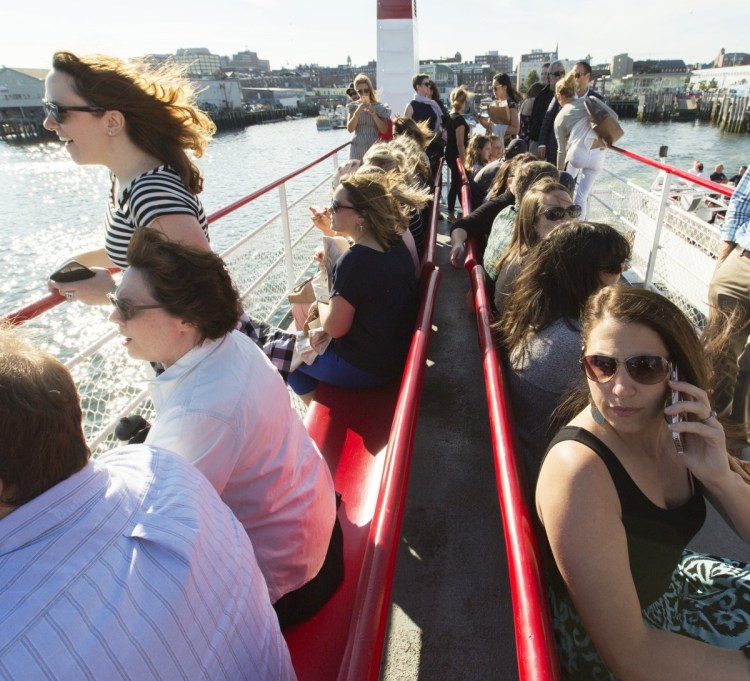A group of Peaks Island residents has asked federal regulators to review whether Casco Bay Lines is meeting grant requirements for public participation in designing a new ferry.
Although a spokesperson for the Federal Transit Administration said the ferry service has met its obligations, one of the concerned residents said the complaint seems to have gotten people’s attention. The ferry service on Friday scheduled a March 23 meeting on the island to discuss the project, and the board of directors plans to vote soon on the vessel’s capacity. In addition, the district city councilor is advocating for an impact study about how a larger ferry will affect islanders.
Resident Lisa Penalver sent letters to the FTA, Casco Bay Lines, city administrators and elected officials. She hopes everyone can come together to address the challenges of having so many people visiting the island, including safety concerns stemming from the congestion at the island landing and a lack of public facilities for visitors.
“This whole conversation needs to be looking at a much broader approach to the congestion that’s happening and to the demand for people to go to Peaks Island,” Penalver said. “We’re being marketed as a park. And we don’t have bathrooms. We don’t have shelters. And we don’t have water fountains.”

Penalver is one of several island residents who feel shut out of the planning process for the new ferry, which could carry 200 additional passengers per trip. They worry a larger ferry will lead to more visitors, which will overwhelm their community with tourists. She serves on the Peaks Island Council, but sent the letters as a resident, not on behalf of the council.
In a March 4 letter to Peter Butler, the acting regional administrator of the Federal Transit Administration’s Region 1 office, she said the Casco Bay Island Transit District is not having a meaningful dialogue with residents, even if they are meeting the minimum requirements for public participation.
Penalver said meetings about the proposed ferry design and capacity have been sparse and poorly advertised. The letter, co-signed by eight other island residents, said that copies were also sent to Casco Bay Lines, Portland City Hall, Mayor Ethan Strimling, City Councilor Belinda Ray and the offices of U.S. Sens. Susan Collins and Angus King, among others.
“Many of us on Peaks Island believe that the needs of tourists are being prioritized by CBITD, at the expense of the interests and wellbeing of those who live on the islands,” she wrote.
While some island residents worry that a larger ferry will increase congestion on the island, ferry officials argue that they’re trying to meet existing demand without bumping passengers to later ferries or using a second vessel on busy summer afternoons.
In 2018, more than 784,000 people took the ferry to Peaks Island and the ferry hit its capacity on 23 outbound trips and 45 inbound trips, according to ridership information provided by Casco Bay Lines. That’s a 10 percent increase in ridership over the roughly 712,800 people who took the ferry to Peaks in 2014. And the ferry hit its capacity more times in 2018 than in 2017.
Hank Berg, general manager of Casco Bay Lines, said they have been exceeding the public participation requirements of the grant. He emphasized that no final decisions have been made regarding vessel size or design. He said the board of directors will hear public input before making a decision on the ferry design and capacity.
“I’m not concerned about losing the federal funding, because we’re doing everything we’re supposed to be doing and more,” Berg said.
A spokesperson for the FTA said there has been in contact with Casco Bay Lines about the concerns, even though the federal agency agreed that the bay lines have met the grant requirements for public participation.
Penalver said her letter seems to have made an impact. In addition to the informational meeting, City Councilor Ray has been in contact with the Peaks Island Council about possibly conducting a study to determine the impacts a larger ferry will have on the island infrastructure and environment, she said.
“This needs to be a much more open process,” Penalver said. “People need to understand these are big decisions they’re making. It’s $10 million, but it’s also the future of our community. It’s a really special place and I don’t want to see it destroyed.”
Ray said in a February email to the Peaks Island Council that she’d like the study to include an assessment of tourism’s impact on the island ecology and conservation areas, as well as infrastructure issues such as parking.
And Berg said in an email to the council that the board has scheduled a March 28 vote on carry capacity of the new vessel. The ferry service will hold a public meeting on March 23 on the island to gather feedback for the board.
Casco Bay Lines is looking to replace the Machigonne II, which was put into service in 1987 and can carry 399 passengers and 12 vehicles. Engineers are drafting plans for a larger ferry that could carry about 600 passengers and 16 vehicles. But they were recently sent back to the drawing board after discovering that the initial boat design risked running aground when docking at Peaks Island and that the vehicle ramp would have been too steep.
The new ferry is expected to cost about $10 million, with 85 percent of those costs being covered by federal funding, including a $6 million grant announced last year.
The ferry was originally expected to be in service by late 2021, but Berg said the redesign may end up delaying the project. He was still confident that they can design a vessel to move the same number of people and vehicles.
Send questions/comments to the editors.



